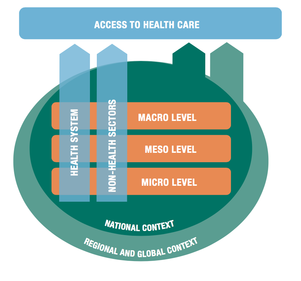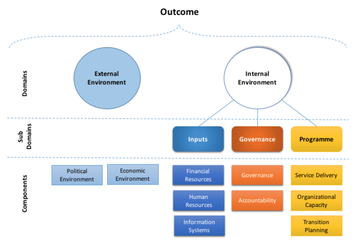Research Areas
Dr. Amaya's area of expertise is global health policy and the global governance of health. Her research has entailed understanding the impact of new global health institutions and issues on the health systems of low- and middle-income countries, most recently examining regional organizations in the Global South and the impact of COVID-19 on health disparities.
Other areas of expertise include: the politics of global health; health diplomacy; and the sustainability of development aid for health. She has worked on several research projects addressing these topics and some examples of these are presented below.
Other areas of expertise include: the politics of global health; health diplomacy; and the sustainability of development aid for health. She has worked on several research projects addressing these topics and some examples of these are presented below.
It is clear that countries within each region have particular needs and resources, as well as different degrees of vulnerability to epidemics and thus must deal with their own complexities that require local and specific solutions. |
REGIONAL HEALTH POLICIES
Collective action and COVID-19 Dr. Amaya has researched the role of regional organizations in supporting Member States’ health systems in the context of COVID-19, as well as and reaching the SDGs through the development of indicators of progress and success. Recently, she has explored the effect of regional collective action on promoting equitable decision-making at the global level as well as reducing disparities within countries. Click here for a recent paper published in Globalization and Health discussing how regional cooperation can support member states address the COVID-19 crisis. Health diplomacy at the regional level In the Poverty Reduction and Regional Integration (PRARI) project, she employed a participatory methodology to organize workshops with key actors from different sectors (such as regional organizations, government bodies, NGOs and academia) from Southern African (SADC) and South America (UNASUR) to identify health priorities and reach joint solutions for health systems strengthening. This process also sought to develop inclusive regional and national policies and ultimately find mechanisms to promote health as a human right. European health and science diplomacy Dr. Amaya also led a work package of the European Leadership in Cultural, Science and Innovation Diplomacy (EL-CSID) project that sought to understand how EU diplomacy can support inter-regionalism in the Global South. In the EL-CSID project, she led a team collecting data on EU collaboration with six regions and sub-regions (Eastern Europe, Latin America, Middle-East, North Africa, Southeast Asia and Sub-Saharan Africa) and jointly developed a framework to evaluate effective promotion of regionalism and inter-regionalism. |
 Source: Samuels, F., Amaya, A.B., and Balabanova, D., 2017
Source: Samuels, F., Amaya, A.B., and Balabanova, D., 2017
HEALTH SYSTEMS STRENGTHENING
What drives progress in health at different levels of the health system?
It is now widely understood that factors and sectors outside of health have a pivotal role to play in supporting health systems. With this in mind, she has sought to identify barriers and facilitators for the effective implementation of health policies. She has collaborated on several health system strengthening projects in the past, including the Good Health at Low-Cost project funded by the Rockefeller Foundation, which sought to understand why some low and middle income countries manage to achieve good health outcomes while others fail by drawing from case studies from Bangladesh, Ethiopia, Kyrgyzstan, Tamil Nadu and Thailand. She also collaborated on a report researching the macro- meso- and micro- level drivers of progress within the health system through the development of an original framework to contribute to the post-2015 agenda. It was informed by five case studies (Cambodia, Mozambique, Nepal, Rwanda and Sierra Leone), exploring progress in maternal and child health (MCH) and neglected tropical diseases (NTDs). Click here to access a paper from this project that was published in the journal of Health Policy and Planning.
The value of horizontal programming and health worker issues
Dr. Amaya's initial involvement in health policy research involved contributing to a policy manual for the management of tuberculosis in prisons in Latin America and analyzing national health budgets and tuberculosis funding for 12 priority countries. She also researched the value of the integrated management approach (specifically the Integrated Management of Adolescent and Adult Illness - IMAI) on reaching the health-related Millennium Development Goals in countries with a high HIV burden. Moreover, for several years she was involved in research looking at Health Human Resources issues (primarily the development and migration of health workers) in Latin America and the Caribbean.
What drives progress in health at different levels of the health system?
It is now widely understood that factors and sectors outside of health have a pivotal role to play in supporting health systems. With this in mind, she has sought to identify barriers and facilitators for the effective implementation of health policies. She has collaborated on several health system strengthening projects in the past, including the Good Health at Low-Cost project funded by the Rockefeller Foundation, which sought to understand why some low and middle income countries manage to achieve good health outcomes while others fail by drawing from case studies from Bangladesh, Ethiopia, Kyrgyzstan, Tamil Nadu and Thailand. She also collaborated on a report researching the macro- meso- and micro- level drivers of progress within the health system through the development of an original framework to contribute to the post-2015 agenda. It was informed by five case studies (Cambodia, Mozambique, Nepal, Rwanda and Sierra Leone), exploring progress in maternal and child health (MCH) and neglected tropical diseases (NTDs). Click here to access a paper from this project that was published in the journal of Health Policy and Planning.
The value of horizontal programming and health worker issues
Dr. Amaya's initial involvement in health policy research involved contributing to a policy manual for the management of tuberculosis in prisons in Latin America and analyzing national health budgets and tuberculosis funding for 12 priority countries. She also researched the value of the integrated management approach (specifically the Integrated Management of Adolescent and Adult Illness - IMAI) on reaching the health-related Millennium Development Goals in countries with a high HIV burden. Moreover, for several years she was involved in research looking at Health Human Resources issues (primarily the development and migration of health workers) in Latin America and the Caribbean.
 Source: Amaya, A.B. et al., 2015
Source: Amaya, A.B. et al., 2015
HOW GLOBAL ACTORS CAN CONTRIBUTE TO SUSTAINABLE HEALTH PROGRAMS
The transition to sustainability of the HIV/AIDS programme in Peru
Improvements in population health require evidence-based policies that are aimed at the users considering their local realities and resources. Her research in this area has focused on transition towards sustainability of disease activities funded by the Global Fund. Her doctoral thesis explored the specific case of the HIV/AIDS program in Peru and its transition to programmatic sustainability. This research study not only focused on health financing and how global health partnerships have an impact on health policy but also on the governance structures in place to coordinate and implement health programs. The thesis resulted in policy recommendations to funders and country actors on how to plan for transition from aid. Click here to access one of the project papers.
Global Fund transition preparedness framework and tool
In addition, Dr. Amaya developed a transition preparedness assessment framework and tool (commissioned by the Global Fund) that was piloted in several Eastern European countries (Belarus, Bulgaria, Georgia and Ukraine). This tool was employed by the Global Fund to gauge transition readiness among recipient countries and to help them address transition risks prior to receiving funding.
The transition to sustainability of the HIV/AIDS programme in Peru
Improvements in population health require evidence-based policies that are aimed at the users considering their local realities and resources. Her research in this area has focused on transition towards sustainability of disease activities funded by the Global Fund. Her doctoral thesis explored the specific case of the HIV/AIDS program in Peru and its transition to programmatic sustainability. This research study not only focused on health financing and how global health partnerships have an impact on health policy but also on the governance structures in place to coordinate and implement health programs. The thesis resulted in policy recommendations to funders and country actors on how to plan for transition from aid. Click here to access one of the project papers.
Global Fund transition preparedness framework and tool
In addition, Dr. Amaya developed a transition preparedness assessment framework and tool (commissioned by the Global Fund) that was piloted in several Eastern European countries (Belarus, Bulgaria, Georgia and Ukraine). This tool was employed by the Global Fund to gauge transition readiness among recipient countries and to help them address transition risks prior to receiving funding.